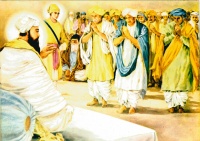Template:AOW266: Difference between revisions
Hari singh (talk | contribs) No edit summary |
Hari singh (talk | contribs) No edit summary |
||
| Line 1: | Line 1: | ||
{{aowh|[[Martyrdom of Guru Tegh Bahadur]]}} | {{aowh|[[Martyrdom of Guru Tegh Bahadur]]}} | ||
[[ | [[File:New s008.jpg|thumb|200px|left|[[Guru Tegh Bahadur]] with the [[Kashmiri Pandits]] ]] | ||
On '''[[July 11]] [[1675]]''', the ninth [[Sikh Guru]], [[Guru Tegh Bahadur]] sets off from [[Anandpur sahib]] for [[Delhi]] in what was to become a world first; the sacrifice of his life for the religious rights and freedoms of the [[Kashmiri Pandits]]. | On '''[[July 11]] [[1675]]''', the ninth [[Sikh Guru]], [[Guru Tegh Bahadur]] sets off from [[Anandpur sahib]] for [[Delhi]] in what was to become a world first; the sacrifice of his life for the religious rights and freedoms of the [[Kashmiri Pandits]]. | ||
Latest revision as of 20:16, 4 February 2012
On July 11 1675, the ninth Sikh Guru, Guru Tegh Bahadur sets off from Anandpur sahib for Delhi in what was to become a world first; the sacrifice of his life for the religious rights and freedoms of the Kashmiri Pandits.
This was to be the first step and the beginning of an extremely important event in Sikh history. It was to have a profound impact on the future direction of Sikhism, the religion of the Sikhs.
Guru Tegh Bahadur undertook the supreme sacrifice for the protection of the most fundamental of human rights - the right of a person to freely practice his or her religion without interference or hindrance. In modern times, we tend to take this freedom for granted – but in 1675, millions of people were denied this basic right.
However, what is even more astonishing is the fact that the Guru was not protecting the right of the Sikhs to practise their religion but instead the rights of the non-Sikh peace-loving people from Kashmir. .....More

